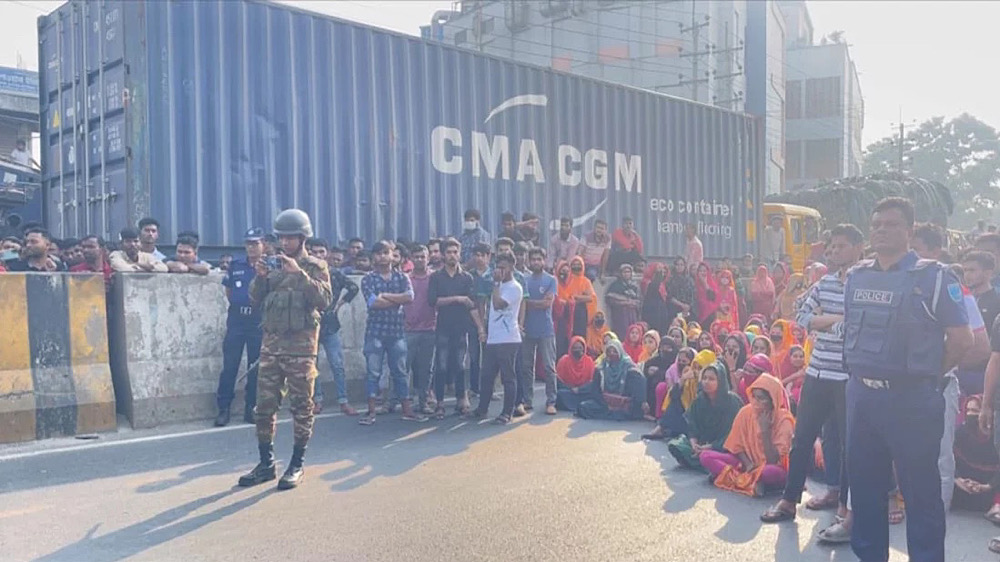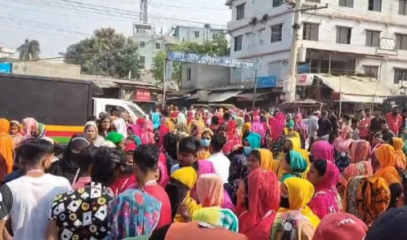Gazipur: Textile workers protest over unpaid wages and Eid bonuses
The sector drives the Bangladeshi economy with 85% of total exports and a related industry worth 47 billion dollars. However, many workers are demanding payment of numerous months of arrears and bonuses linked to the festival celebrating the end of Ramadan. The empty promises of company management, with the police repressing the demonstrations.
Dhaka (AsiaNews) - Families in Bangladesh are preparing for Eid al-Fitr, which marks the end of Ramadan, the holy month of fasting and prayer, planning trips to their native villages and families of origin in a climate of deep uncertainty linked to the situation of textile workers: the clothing industry, one of the most important in the Asian nation, is experiencing a critical period due to the non-payment of salaries and bonuses.
However, for many, the additional bonuses linked to the holiday are ‘only’ a secondary concern: the first problem is represented by the monthly salaries withheld by the factories to cover costs.
The workers have protested in front of the offices of the Bangladesh Garment Manufacturers and Exporters Association (Bgmea) and the Ministry of Labour; however, their requests remain unanswered by both employers and government authorities.
Yesterday, hundreds of workers from the Hagg Knitwear clothing factory in Kaliakoir, Gazipur, demonstrated, blocking the Dhaka-Tangail motorway for an hour, after discovering that the factory gates were closed and their wages and Eid bonuses had not been paid for three months.
The picket, which began at around 7.30 in the morning, caused serious traffic problems until the police intervened and cleared the road at around 8.30. The workers claim that the factory management ignored their repeated appeals, leaving them in a financial limbo a few days before the holiday and at a critical time for families, who rely on bonuses and salaries to cover holiday expenses. ‘We have no certainty that we will be able to feed our families or buy clothes for our children,’ Mohammad Rahim, a textile worker, told AsiaNews.
The demonstrators claim that the factory authorities repeatedly assured them that payments would be made, and then sealed off the plant and left without providing any explanation.
‘We have been patient, but their lies have pushed us to act,’ said another worker, who asked to remain anonymous for fear of reprisals. The crowd dispersed only after the police and the factory managers promised to mediate with the management.
The police superintendent in Gazipur, AKM Zahirul Islam, said that negotiations were underway: ‘We are working to ensure that salaries and bonuses are paid before Eid. Our priority is to resolve the issue peacefully’. On the other hand, the factory representatives remain unreachable and do not intend to comment on the matter, fuelling the climate of mistrust and the workers' concerns.
The Hagg Knitwear protest reflects a broader pattern of union unrest in the run-up to the holidays. In Uttara, 200 Roar Fashion employees have been camped out in front of the Bgmea building since 23 March to demand payment of unpaid wages and severance pay.
Similar demonstrations have broken out near the Ministry of Labour, with workers accusing factory owners and regulatory authorities of systematic negligence.
The billion Bangladeshi garment industry, which employs over four million workers, faces recurring criticism for wage delays and safety conditions. Although the government imposes bonuses and end-of-Ramadan awards, their application remains lax, leaving workers vulnerable.
Saleh Uddin Sifat, joint secretary of the National Citizen Party (NCP), expressed the support of the trade association for the workers. Among the demonstrators there were also employees of Style Crafts Limited, who are demanding 14 months' back pay and witnessed the death of a company official who suffered a stroke during the mobilisation.
Nearby, workers from Apparels Eco Plus Limited demanded three months' unpaid wages, while employees of Bhalukar Roar Fashion Limited continue their sit-in to demand wages and severance pay.
The driving force of the national economy, the clothing industry in Bangladesh in 2022-23 accounted for almost 85% of total exports, reaching almost 47 billion dollars.








.png)










